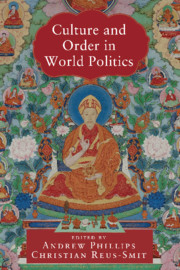Book contents
- Culture and Order in World Politics
- LSE International Studies
- Culture and Order in World Politics
- Copyright page
- Contents
- Additional material
- Contributors
- Preface
- Part I Introduction
- Part II Historical Orders
- Part III The Modern ‘Liberal’ Order
- 6 Cultural Diversity within Global International Society
- 7 Liberal Internationalism and Cultural Diversity
- 8 When Liberal States Bite Back
- 9 Global Institutional Imaginaries
- Part IV Constitution and Contestation
- Part V Conclusion
- References
- Index
7 - Liberal Internationalism and Cultural Diversity
from Part III - The Modern ‘Liberal’ Order
Published online by Cambridge University Press: 25 December 2019
- Culture and Order in World Politics
- LSE International Studies
- Culture and Order in World Politics
- Copyright page
- Contents
- Additional material
- Contributors
- Preface
- Part I Introduction
- Part II Historical Orders
- Part III The Modern ‘Liberal’ Order
- 6 Cultural Diversity within Global International Society
- 7 Liberal Internationalism and Cultural Diversity
- 8 When Liberal States Bite Back
- 9 Global Institutional Imaginaries
- Part IV Constitution and Contestation
- Part V Conclusion
- References
- Index
Summary
This chapter explores how liberal internationalism, the order’s animating 'regime of thought and action', has addressed the question of cultural diversity. It argues that liberal internationalism evinces no simple or singular theory about cultural diversity, and that since the nineteenth century four different approaches are apparent, combining, at distinct moments in time, to form what we see here as distinctive liberal diversity regimes. These approaches are to build a liberal order on the pluralism of Westphalian sovereignty; to confine issues of culture within domestic civil societies; to foster ideas of modernization that would in time erase global cultural differences; and to construct institutions of 'exclusion,' manifest in political hierarchies and, at the extreme, formal empire. In the late nineteenth and early twentieth centuries, civilizational and racial prejudices informed how these approaches were interwoven, but by the end of the Cold War these had been replaced with more universalistic conceptions of human rights, multiculturalism, and civic nationalism. It was at this very moment, however, that the now-globalized liberal international order revealed its limits.
Keywords
- Type
- Chapter
- Information
- Culture and Order in World Politics , pp. 137 - 158Publisher: Cambridge University PressPrint publication year: 2020
- 3
- Cited by

